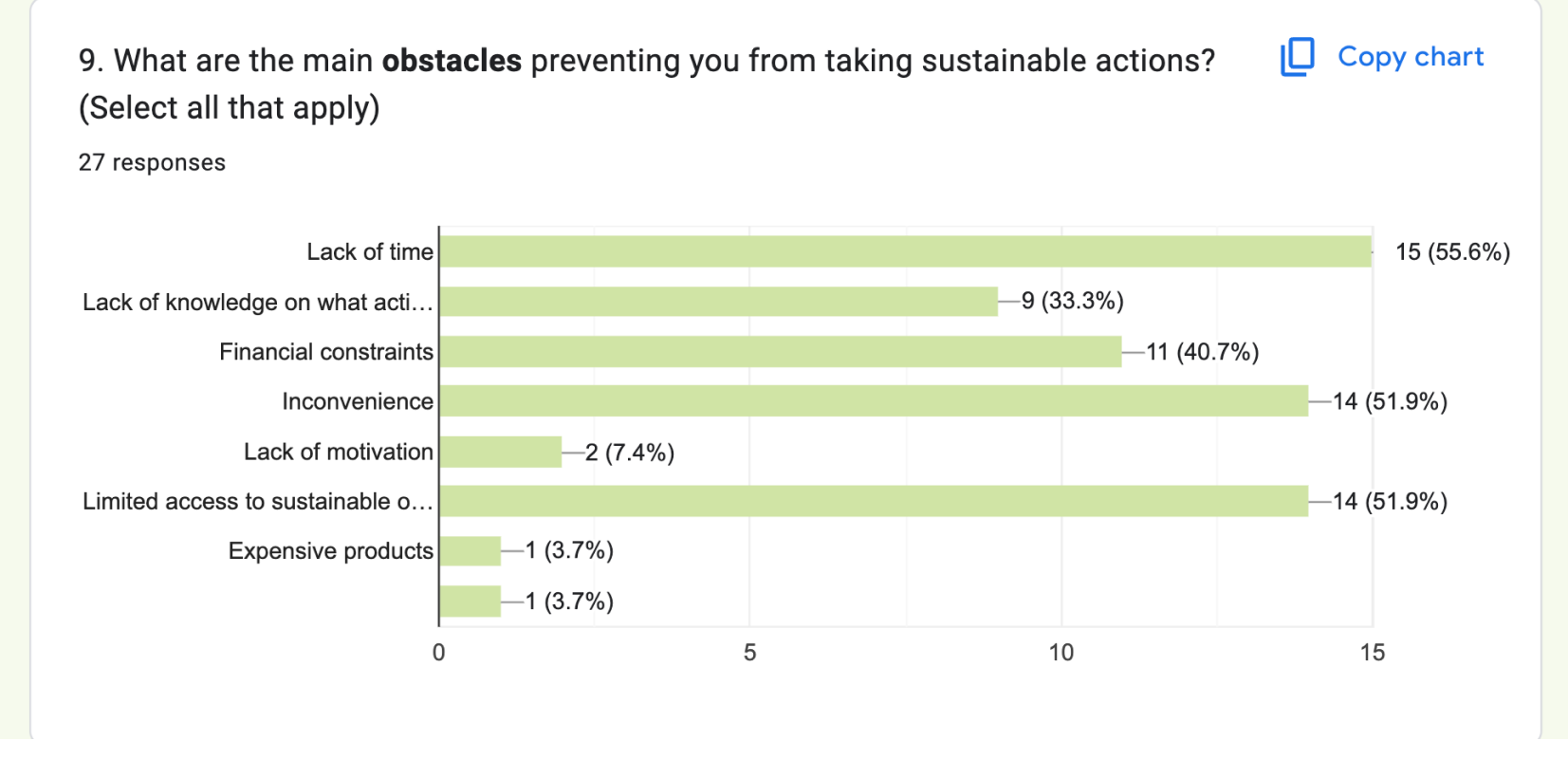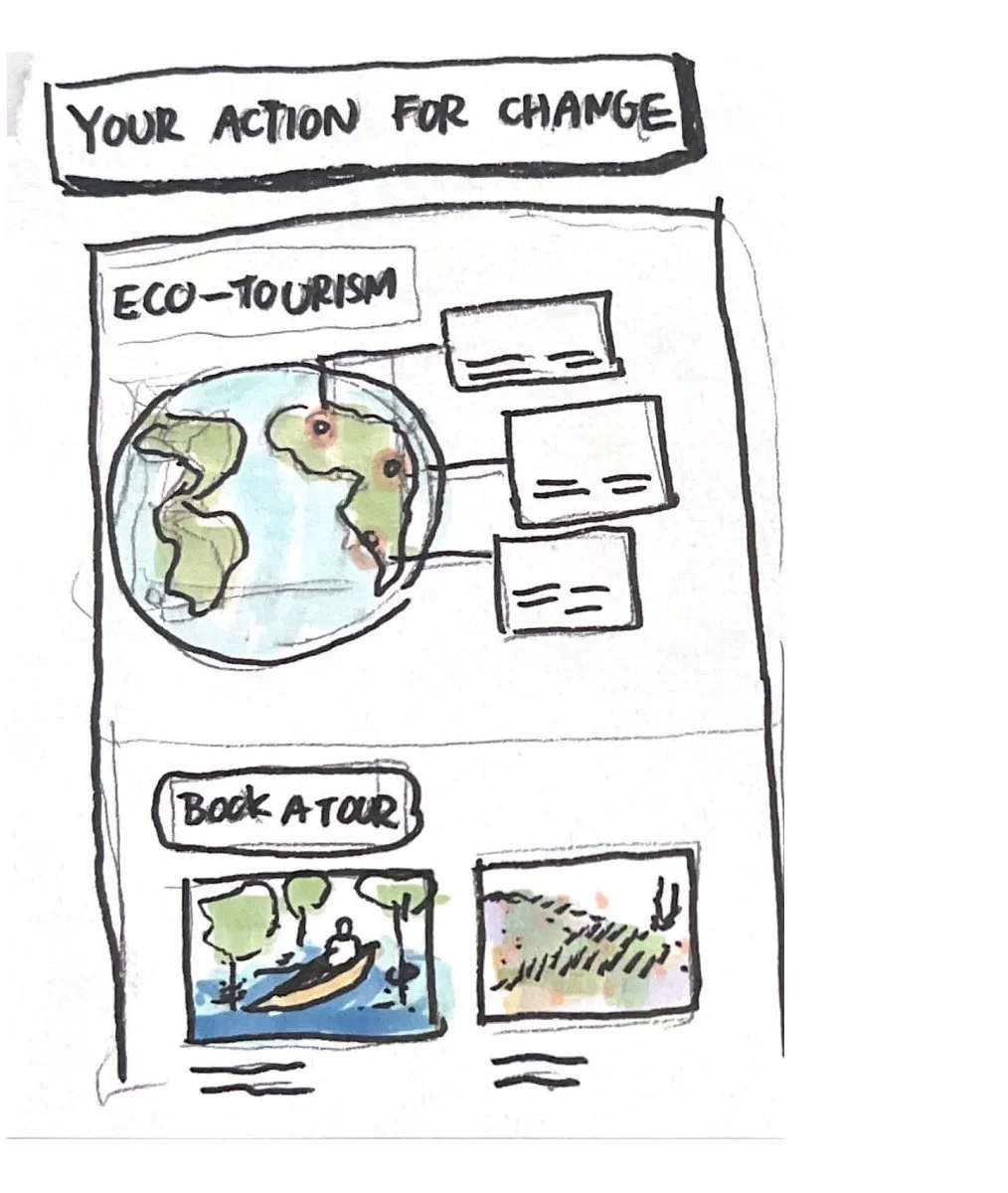1.Nature tour platform: Book eco-tourism experiences and connect with natural environments.
2.Web AR visualization: Use AR to visualize “before and after” environmental changes with a time machine slider, accessible for everyone
3.Zero-waste membership: Earn points for sustainable actions, redeemable for eco-friendly products.
4.Everyday Nature Integration: Urban green spaces, like community gardens or biophilic designs in homes.
5.Environmental Education: Online or in-person programs in schools, universities, or community workshops on sustainability.
6.Sustainability Practices: volunteering for conservation, cleaning up trash on the beach
Insight
Environmental Responsibility and Actions
Importance of Responsibility: The majority (85%) feel personal responsibility for protecting the environment, which is encouraging for promoting sustainable behaviors.
Sustainable Actions: Popular actions include recycling (88.9%) and supporting eco-friendly products (74.1%). There is less participation in volunteering and sharing information on social media, highlighting areas for potential growth.
Obstacles: Key barriers include financial constraints (61.9%) and lack of knowledge (33.3%). Addressing these challenges through affordable solutions and educational initiatives could increase participation.
Perceived Environmental Issues
Main Concerns: Pollution (air, water, soil) and climate change rank highest, with 92.6% and 74.1%, respectively. Waste management and biodiversity loss are also significant concerns.
Disconnection from Nature: 40.7% feel this issue is very significant, reinforcing the importance of reconnecting people with the environment.
Reactions to Environmental Disasters
Common reactions include feeling motivated to learn more (14.8%) and offering help if possible. Checking on others’ safety is another notable response.
Attitudes Towards Sustainable Solutions
Impact of Individuals: Most respondents (44.4%) strongly agree that individuals can make a meaningful impact, reflecting optimism for change through collective effort.
Motivations: Practical motivators include financial incentives, access to sustainable products, and visible positive changes. Social influence also plays a role.
Interest in Nature Reconnection:
Respondents value everyday nature integration (urban green spaces) and zero-waste membership highly, both of which emphasize reconnecting with nature and sustainability. An eco-tourism platform complements these interests by encouraging people to actively experience nature in sustainable ways.
Practical Actions for Engagement:
Many participants are already inclined to take sustainable actions like supporting eco-friendly products and reducing waste. An eco-tourism platform can capitalize on this by offering eco-conscious travel options, such as:
Booking sustainable accommodations.
Participating in guided nature tours with environmental education components.
Highlighting destinations with conservation programs.
Connection with Motivators:
The top motivators—protecting nature for future generations and a sense of responsibility—align perfectly with eco-tourism. The website can promote these values by showcasing the positive impact of eco-friendly travel on preserving natural habitats and biodiversity.
Digital Accessibility:
Respondents are moderately connected to nature and spend time outdoors occasionally. An eco-tourism platform provides an opportunity to inspire deeper connections by making nature exploration accessible, enjoyable, and educational.
Support for Awareness and Action:
The website can include features to raise awareness, such as:
Interactive maps of eco-friendly destinations.
Information about local environmental challenges and how tourism supports conservation efforts.
A section on responsible travel tips for minimizing environmental impact.
Findings
Solutions Analysis and Recommendations:
Eco-Tourism Platform (Nature Tour Booking):
Insights: With 44.4% interest, this is a moderately popular option. Participants value opportunities to connect with nature directly but may face barriers such as cost and accessibility.
Recommendation: Create an affordable and localized eco-tourism platform that emphasizes community-based activities. Include educational components to foster awareness during the tours and offer discounts for environmentally conscious behaviors.
Zero-Waste Membership:
Insights: Garnering 48.1% interest, this option highlights participants' desire for structured incentives to adopt sustainable habits.
Recommendation: Design a membership program that integrates gamification (e.g., earning points for sustainable actions). Partner with eco-friendly brands to provide discounts and rewards for active participation.
Everyday Nature Integration:
Insights: With 85.2% interest, this is the most favored solution. People want green spaces embedded in their daily lives for a constant reminder of nature's value.
Recommendation: Advocate for urban development projects that prioritize biophilic designs (e.g., rooftop gardens, community parks). Provide workshops and resources to help individuals create small green spaces at home or work.
Web AR Visualization:
Insights: At 25.9% interest, this option appeals to a niche group interested in technology-driven solutions.
Recommendation: Develop an AR tool that visualizes environmental changes and integrates decision-making scenarios. Offer it as an educational module for schools or community groups.
Environmental Education and Sustainability Practices:
Insights: Though these solutions rank lower, they remain critical for addressing knowledge gaps (noted by 33.3% of respondents as a barrier).
Recommendation: Integrate these into other solutions, such as offering workshops through the eco-tourism platform or including educational content in the zero-waste membership.
Persona
Name: Sarah Green
Age: 30
Occupation: Marketing Specialist
Location: Urban area with limited green spaces
Motivation: Wants to reduce her environmental footprint and inspire her community.
Challenges: Busy schedule, lack of accessible resources, and uncertainty about where to start.
Goals: Learn easy, impactful ways to live sustainably and encourage others to do the same.
User Journey for Sustainable Actions
1. Awareness:
Sarah comes across a social media post about the eco-tourism platform. She learns about its goal to promote sustainable travel and support local communities.
2. Engagement:
She downloads the platform's app and explores eco-tourism activities in her city. She also notices a zero-waste membership section.
3. Decision-Making:
Intrigued, Sarah signs up for a free membership trial. She earns her first points by pledging to use reusable bags and compost kitchen waste.
4. Action:
Sarah books a weekend nature tour through the platform. During the trip, she attends a workshop on reducing plastic use and learns practical tips.
5. Impact:
Motivated by the trip, Sarah starts a community project to set up a shared garden in her apartment complex. She continues to use the platform to track her impact and earn rewards for sustainable actions.

















